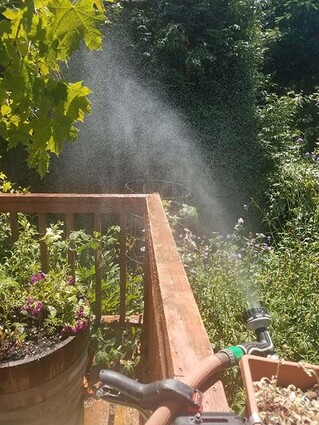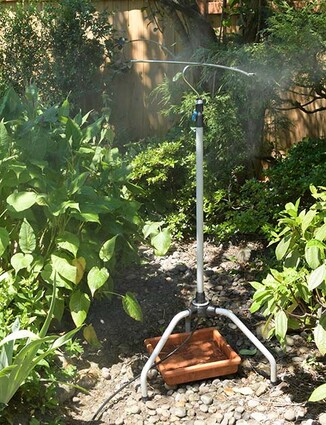Hot birds are not happy birds
Last updated 7/6/2021 at Noon
Well, good people, the heat is upon us. You and I, when it gets too hot, can remove clothing, just like we can add clothing when we get too cool. But for our birds it’s an entirely different story. They can not add or remove anything; they have to find a way to cool down.
Sure, they can get in the shade — just like we do — and they can immerse themselves in water and allow evaporation to cool them off. But these options are limited.
Here’s how we can help. In the photo below, Andy Thomas, a dedicated birder, is showing his method of suppling a fine mist for birds to step into, to envelope themselves with tiny droplets of water that will then evaporate and cool them down. Andy has used his household equipment to rig up a mister by clamping a hose with a misting head to his porch railing and misting the shrubs in his backyard.
In the photo to the right is another device that Sandy Leaptrott uses. It’s an Aeromist, a portable misting tower. It works slick as snot on a doorknob at providing just the right pressurized water to help cool down our birds. She also gets an “A” for placing that terra-cotta plant saucer under the tripod for the drippings to fill it so it becomes a birdbath for her sparrows.
Unlike Andy’s device, however, which would require moving the house to put it in a different location, (ha ha) you can just pick up the Aeromist and plunk it down in a different spot. You can obtain additional info on the Aeromist at www.aeromist.com.
A WORD OF WARNING! Before you erect or place a mister, make sure you’re not going to flood a bird nest nearby. That could be a different type of tragedy, getting the babies wet.
Please review what I received from Elise Wolf of Native Bird Care of Sisters, who has been rehabbing small birds since Hector was a pup.
“My guess is baby birds in nest boxes, on homes, and others in more exposed areas are dying by the thousands right now from excess heat. Baby birds cannot thermoregulate until they have some feathers. However, bird temps run high, so they can tolerate some heat. Open-nest parents (such as robins) will incubate to try to cool babies. But the excessive heat we’ve experienced lately may be more than they can handle.”
Here’s some of her options:
For birds in nesting boxes: Make sure the nest box is facing north and in a shaded area. Do this incrementally if you must move it a long way. If the birds are near fledging, this may prompt them to jump out, but better that than being baked. Or add an umbrella (for shade) above the box. Or strap freezer ice packs to the base and top of the nesting box. (Do not spray the box with water. That will make it hot and humid for the babies — not good. Also, fungus grows fast in hot, wet environments and aspergillosis is a risk for any bird exposed to that situation.) Make sure a nesting box has vent holes.
If birds are nesting on the home: If they are near the roof, they are cooking right now.
Options are to move the birds to an open nest box (appropriately sized) and install it as close to the original area as you can.
Keep it completely shaded and not up against the roof.
If babies are gaping and chirping, this is an easier task to accomplish as the parents will hear where their babies have been moved to.
Once the parents are actively attending to the babies in the new box, you can move it incrementally to a cooler location.
About a foot every hour or so.
Just keep watching the parents to ensure they are coming and going.
Be on high alert to how much stress you are causing the parents.
You do not want to cause them to abandon the babies.
Swallows especially are high-stress birds.
Take more time if that is what they need.
Open nesters: Other than shading the birds better, just not much we can do. If you try to mist them, you can wind up making the nest wet, and that would just not be good.
These are all good suggestions, but sometimes unnatural human interventions can be more disruptive than the original threats to life and welfare. So, please, be cautious.













Reader Comments(0)